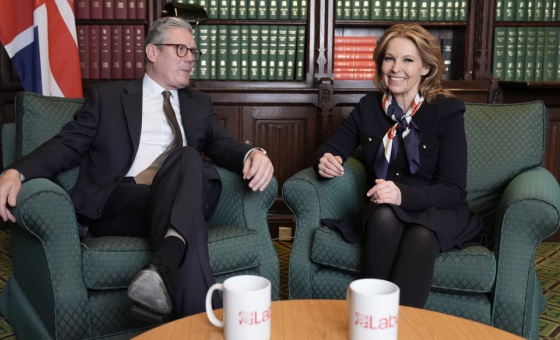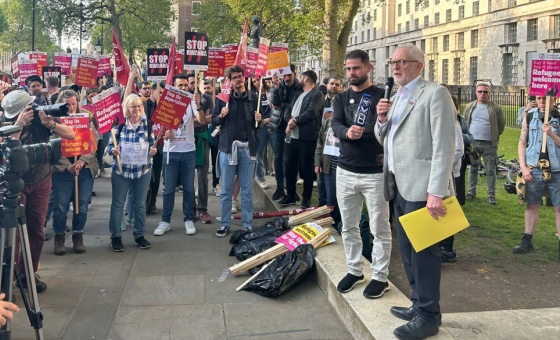This is the last article you can read this month
You can read more article this month
You can read more articles this month
Sorry your limit is up for this month
Reset on:
Please help support the Morning Star by subscribing here
TO WHAT extent should we be political realists? The answer is to a very large extent. After all, what is the point of political involvement unless it focuses on achieving positive change? Without a strategic, pragmatic perspective, our commitments can easily become mawkish moralisms, making us feel comfortable about being in favour of “good” things in contrast to the failings of others.
Realism, like most words, is slippery. One person’s reality could easily be another person’s fantasy. Words have a class context too — justice for the many may be a realistic threat to those with wealth and power.
We are so often told that we need to talk about realism on the left. The narrative is familar. Typically, writers in the Guardian or New Statesman might note that while their hearts might be with the left, their heads tell them that the left cannot win. To be realistic, one most accept a more moderate approach, even if one’s goals are radical.
Voting for Jeremy Corbyn, being active in the Green Party or taking part in vibrant protest are different facets of an unrealistic, romantic, even self-indulgent approach. Politics is about winning the general election. The majority of voters are in the middle, so moving left will make it impossible to win. Without beating the Tories in the general election, progress is impossible.
A variation of this theme is to argue that once a non-threatening message can be used to gain votes, a Labour government can instigate useful reforms that reduce inequality and make Britain more democratic.
This is a persuasive message, and it’s not that those who promote it oppose left values — merely they feel that moderating them is necessary for political effectiveness.
Yet such realism, which comes in various forms, can be criticised for preventing rather than accelerating the change needed to create a fairer, democratic and ecological future.
An obvious challenge is that the “realists,” far from being left, are using realism as a reason to win over opponents and prevent change. Polly Toynbee recently stated that “free to dream, I’d be left of Jeremy Corbyn. But we can’t gamble the future on him.”
It would be blunt to call this statement a lie, but while all of us can change our politics, Toynbee was a supporter of the right-wing SDP split from Labour in the 1980s.
She has a long history of promoting “centre-ground” politics and has never, to my knowledge, shown any enthusiasm for Corbyn in the past. Thus realism is a rhetorical device for those who know that outright opposition to left ideals would be less effective in stopping the left than suggesting merely tactical disagreement.
The Toynbee brand of realism can also be condemned as unrealistic. Millions of people voted for parties to the left of Labour at the last election, while the “realists,” almost to a woman and a man, supported the disastrous Blairite Scottish Labour leader Jim Murphy.
As a Green, I am aware that Green realism has often been far from pragmatic. It didn’t take a genius to show that a coalition between the Irish Green Party and right-wing Fianna Fail would lead to catastrophe. That coalition saw the Greens lose heavily, as Ireland was forced into austerity as the price of bailing out the banks.
It would be easy to ridicule Toynbee’s thesis as naive. She wants Yvette Cooper as Labour leader, yet the evidence is that Cooper fails to excite members of her own party, so how likely is she to win new voters to Labour?
Even if Cooper was in my heart, I would wonder why she is only in the hearts of hundreds, rather than hundreds of thousands. The advocates of realism forget that political figures who reject austerity are actually rather popular with voters.
There is also the challenge that realist politics can be contrasted with principled opposition. While a politics without principle is utterly pointless, this is a far from complete response to the realism on offer. A binary opposition between “principle” and “realism” merely describes two paths to failure. Failure to have principled politics is mirrored by failure to achieved principled change.
So-called realism, as presented by Toynbee and similar commentators, is a strategy to prevent change — but if it encourages us to think about how to develop winning strategies it can be subverted.
Some facts are clear: the present government is inflicting violence on many British people, disabled people are targeted, young people are crushed. Debt created by bankers has been passed on to the state and the neoliberal state is now passing it to us. Cuts are destroying local government but the super-rich are being rewarded.
The Conservative government is one manifestation of a consensus of misery, which has been shared to some extent with the Liberal Democrats, with the key players in the European Union and with previous Labour leaders. Yet neoliberalism is now creating the demand for an alternative. Corbynmania, the Green surge and the general election victory of the SNP are all signs that millions of voters, particularly young voters, want change.
Those who have benefited politically have been raised by a tide that they could hardly see was coming. We Greens didn’t expect our membership to rise by 200 per cent in a matter of weeks. When deciding on her university politics options, Mhairi Black was probably not figuring she would have to take time out from exam study to begin her new job at Westminster.
It is an open secret that Corbyn was not expecting to be Labour leader, and that two days before nominations he was sceptical about gaining enough MPs’ signatures to make the ballot. Who knows what will follow and where the rising demand for justice will manifest next, and in what form?
The waters threatening the political Establishment are rising and ideological certainties risk being washed away.
Toynbee noted that “the dispute is not, as Corbynites claim, about core beliefs previously betrayed — but about tactics on how to win, so as to put them into practice.”
I think if we examine such realism we can do well to read between the lines.
Realism states that the British Establishment, including our mainstream media, will simply not allow change. Politics is about money, and the wealthy can increasingly buy their way to victory. The electoral system translates a sliver of gain into a majority. Above all, the media — especially the tabloid media — help shape our views.
The realists believe that the big fish have more power than the minnows, or even moderately sized aquatic life. Rupert Murdoch chooses the British prime minister. Even if he loses his power, the money markets would sink our economy if the public voted for a leader who rejected neoliberalism.
There are even more sinister manifestations of control — Chris Mullins’s excellent book A Very British Coup is a fictional account of how the military and US would remove a Corbyn or Caroline Lucas from No 10.
Let’s pose the question of realism in a different way so it serves not princes (well, elites and establishments) but the people. In Britain in 2015, there is a vast demand for change. The system we have isn’t delivering. Instead of giving up on movement-building and throwing our lot in with Cooper or her safe but unspiring equivalents, let’s measure the obstacles and examine how we can best get round them or undermine them.
A diverse and often contradictory left is attempting to march through British institutions. Enthusiasm is not enough. What is now needed is a detailed strategic debate about how we achieve change.
This could start from a realistic understanding of the forces that impede progress. Neither ignoring them nor simply giving in to them are appropriate. Understanding should help shape focused action.
Yes, we can undermine the power of the super-rich, we can create alternatives to the media, and above all we can use our heads to inform our hearts. Realism is part of radicalism, but not if it simply means reading tracts by those dedicated to insisting that another world is impossible.
Political change demands an engagement with political theory if we are grow diverse movements that deliver a better future.
- Derek Wall is international co-ordinator of the Green Party of England and Wales.










